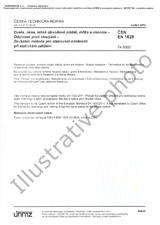We need your consent to use the individual data so that you can see information about your interests, among other things. Click "OK" to give your consent.
ČSN ETSI EN 301447-V2.1.1 (876048)
Satellite Earth Stations and Systems (SES); Harmonised Standard for satellite Earth Stations on board Vessels (ESVs) operating in the 4/6 GHz frequency bands allocated to the Fixed Satellite Service (FSS) covering the essential requirements of article 3.2 of the Directive 2014/53/EU
Translate name
STANDARD published on 1.12.2016
The information about the standard:
Designation standards: ČSN ETSI EN 301447-V2.1.1
Classification mark: 876048
Catalog number: 500834
Publication date standards: 1.12.2016
SKU: NS-668727
The number of pages: 68
Approximate weight : 204 g (0.45 lbs)
Country: Czech technical standard
Category: Technical standards ČSN
The category - similar standards:
Radio relay and fixed satellite communications systemsSatellite
Annotation of standard text ČSN ETSI EN 301447-V2.1.1 (876048):
V2.1.1
The present document applies to Earth Stations located on board Vessels (ESVs) which have the following characteristics:
- " The ESV is comprised of all the equipment, electrical and mechanical, from the antenna itself to the in-terface with other communications equipment on board (usually referred to as the terrestrial interface).
- " The ESV transmits in the frequency range from 5 925 MHz to 6 425 MHz allocated to the Fixed Satellite Services (FSS) (earth to space).
- " The ESV receives in one or more frequencies within the range from 3,700 GHz to 4,200 GHz in the bands allocated to the Fixed Satellite Services (FSS) (space to earth), depending on the ITU Region where the ESV is located.
- " The ESV transmits a single carrier.
- " The ESV uses linear or circular polarization.
- " The ESV operates through a geostationary satellite at least 2° to 3° away from any other geostationary satellite operating in the same frequency band and covering the same area.
NOTE 1: The satellite spacing is mainly equal to 3° in ITU Regions 1 and 3 and 2° in ITU Region 2.
The ESV transmits at elevations greater or equal to the minimum elevation angle declared by the applicant.
" The ESV antenna diameter is not smaller than 2,4 m.
" The ESV is designed for transmission and reception of radio communications signals in accordance with any of the frequency bands specified above.
" The ESV is usually designed for unattended operation.
" The ESV is operating as part of a satellite network (e.g. star, mesh or point to point) used for the distri-bution and/or exchange of information between users.
" The ESV is controlled and monitored by a Network Control Facility (NCF). The NCF is outside the scope of the present document.
The present document applies to the ESV with its ancillary equipment and its various telecommunication ports, and when operated within the boundary limits of the operational environmental profile declared by the applicant and when installed as required by the applicant by declaration or in the user documentation.
The present document is intended to cover the provisions of Directive 2014/53/EU [7] (RE Directive) article 3.2, which states that ". radio equipment shall be so constructed that it both effectively uses and supports the effi-cient use of radio spectrum in order to avoid harmful interference".
The present document incorporates the technical limitations listed in annex 2 of ITU R Resolution 902 (WRC 03) [i.1], ECC Report (05)69 [i.2], and ECC Report (06)91 [i.3].
NOTE 2: According to ITU R Resolution 902 [i.1], any transmission from ESVs within the 300 km minimum distance of each country where the ESV transmit frequency band is used by the Fixed Service will be subject to the prior agreement of the concerned administration(s), which may specify additional operational requirements, or to the relevant ECC Decision.
In addition to the present document, other ENs that specify technical requirements in respect of essential re-quirements under other parts of article 3 of the Directive 2014/53/EU [7] may apply to equipment within the scope of the present document.
NOTE 3: A list of such ENs is included on the web site
Preview of the standard ČSN ETSI EN 301447-V2.1.1 (876048)
We recommend:
Technical standards updating
Do you want to make sure you use only the valid technical standards?
We can offer you a solution which will provide you a monthly overview concerning the updating of standards which you use.
Would you like to know more? Look at this page.




 Cookies
Cookies
